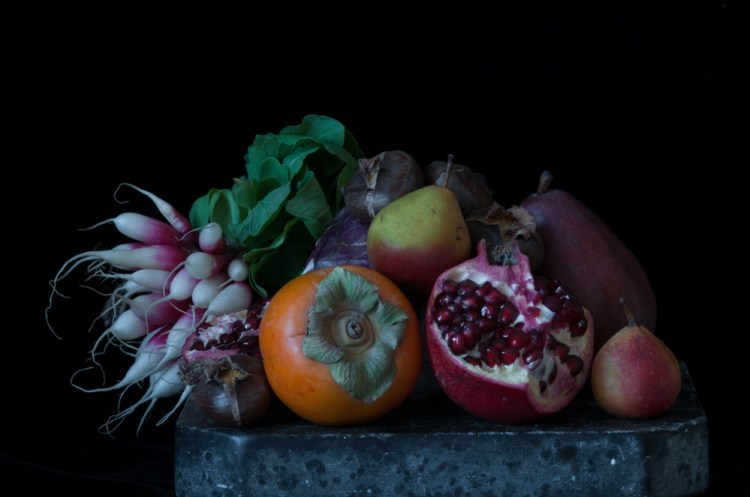Maine Farmland Trust’s John Piotti gives a lot of credit to the Michael Pollans and Barbara Kingsolvers of the world, the gifted storytellers who propelled so many 21st century Americans to start thinking – and caring – about where their food came from. They helped create what he describes as a “broader societal snowball” of interest and appreciation for food and farming that has rolled through Maine and made his job as executive director of Maine Farmland Trust a little easier.
But as cited in multiple nominations, the “visionary,” “tenacious” and “innovative” nonprofit land trust itself has done an extraordinary job bringing that narrative home to Maine and because of that, is the first winner of our annual Storyteller Award.
Their stories aren’t told just on the page, although Maine Farmland Trust does produce a regular newsletter, and beginning in 2014, a lush, beautifully photographed annual journal called Maine Farms. There’s an art gallery at the land trust’s Belfast headquarters, which hangs six to eight shows a year, all featuring some aspect of agriculture life or culture.
The trust also has used film as a media for its message, funding a series of short documentaries, starting with “Meet Your Farmer” in 2010 and more recently, “Growing Local,” which explores the challenges and rewards of farming in Maine.
The goal of Maine Farmland Trust has not been to preserve the past, but rather, to protect Maine’s future. Maine meaning its families, communities and economies. People, not parcels. And its methods draw widespread admiration.
“You know, conservation has sometimes, in the past, been accused of kind of protecting land from people,” said Mike Tetreault, executive director of the Maine chapter of the Nature Conservancy. “One of the things I admire a lot about Maine Farmland Trust is that they are very much about helping communities enable what is a community-held vision, so that it is a shared vision.”
Maine Farmland Trust has saved about 150 farms statewide and protected more than 40,000 acres of farmland, established a network to match potential owners with available land (Farmlink) and leased back donated land to new farmers. To do that, they’ve smartly made farms and farmers a key part of the narrative.
“Aside from air and water, there is nothing more fundamental to us than food,” Tetreault said. “And when you bring the characters who are providing for all of us and what it takes for them to bring their food to us, it really is powerful.”
At the heart of these multimedia forms of narrative, there is Piotti himself, a one-man roadshow. He estimates he’s done 100 talks at Grange halls and the like, bent on conveying a core message of the trust’s mission: Farming has a future in Maine.
When he first started beating the drum, 15 years ago, his audiences had little faith. “Farming was seen as something that was dying, if not dead,” Piotti remembers.
If Maine Farmland Trust was to convince anyone to protect farmland, there had to be a purpose beyond the aesthetic. “How do you get people to open their eyes to the possibilities?” Piotti said. “To get landowners to think about protection if you don’t communicate that there is a vibrant future?”
You tell stories. The films have been a vital part of membership outreach (when Piotti took over in 2006, the nonprofit had 400 members. Now it has 5,000). But as Piotti points out, these can’t be fictions, even pretty ones. Take farm art. The gallery at Maine Farmland Trust was something of an accident – its downtown offices in Belfast came with an empty storefront, and as the staff put photographs on the wall to brighten things up, passersby started asking, “Is this a gallery?” So it became one, but one with a mission beyond sales.
“If our goal was to get people to think that farming had a robust future that was active and real, the artwork that depicted farming was part of the problem,” Piotti said. “It was either overly nostalgic or romanticized or depicted the farmer as the country bumpkin kind of guy. In truth, our gallery shows some pretty pictures, because farms are beautiful. But our gallery has also been used for a show on how pigs are slaughtered.”
That’s been the challenge for these storytellers, and within the agricultural community, the way Maine Farmland Trust has risen to it has been warmly welcomed.
“They are not sugar-coating anything,” said Lisa Webster, president of the Agricultural Council of Maine. “They show the raw truth of what is going on.”
At those Grange meetings, and elsewhere, Piotti says he gets a much different response from audiences now. Faith and hope in the future of farming are on the rise.
“The public consciousness, by and large, has changed in the last five years,” he said. “I like to think in a small way, Maine Farmland Trust has contributed to that.”
Send questions/comments to the editors.



